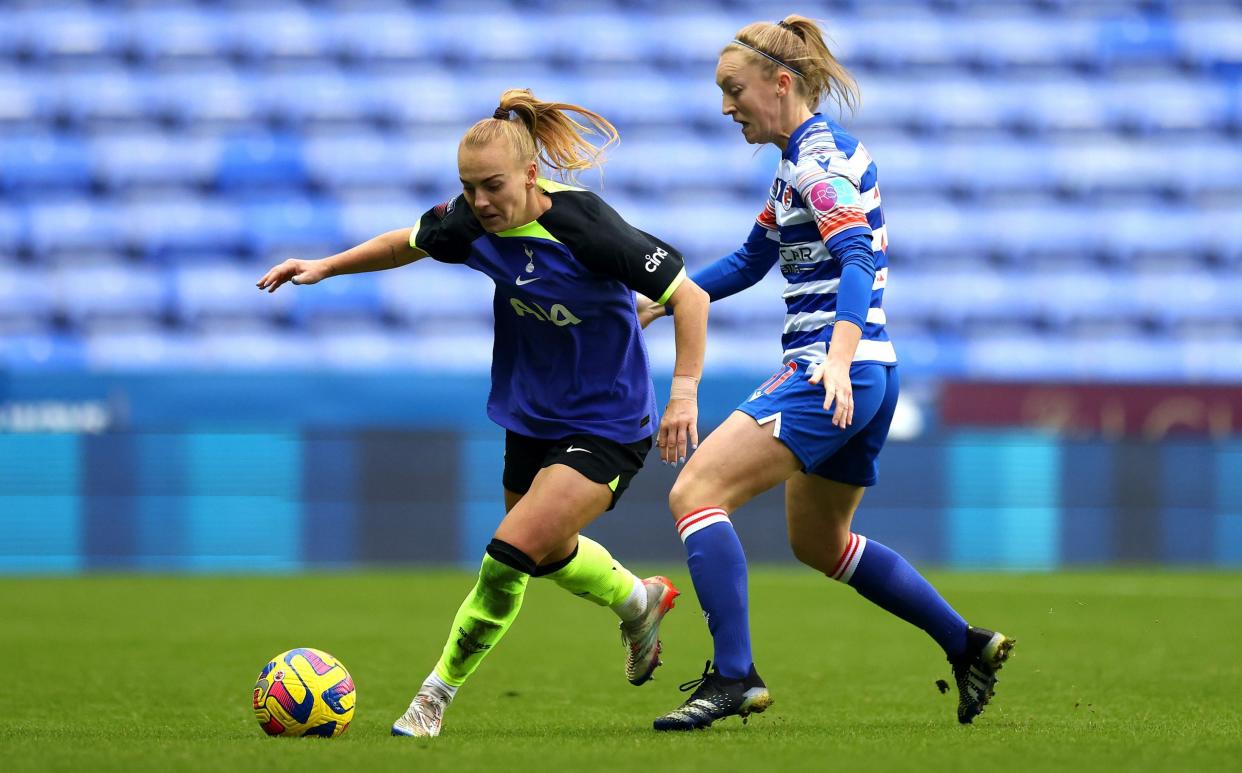The Euros bounce has not spread equally across the WSL – as matchday at Reading proved

Ahead of kick-off at the near-empty Madejski Stadium, Sweet Caroline blared out of the speakers.
The song may have defined this past summer's Euros, where the Lionesses roared to glory in front of record crowds but, with just 1,052 in attendance for Sunday's Women's Super League fixture between Reading and Tottenham Hotspur, the tune felt less uplifting.
Instead it was a glaringly obvious reminder that the Euros bounce has not affected all clubs across the top division equally.
Less than 24 hours after Manchester United thrashed Aston Villa in front of their biggest-ever crowd of 30,196, the Madejski felt hollow for Reading's second league win of the season. A dire own goal from Tottenham's Amy Turner ended up proving the difference, and the 1-0 win pulled Reading up to 10th.
Manager Kelly Chambers was delighted, especially as only 12 of her players could train on Friday due to a flu outbreak in the camp, but the number of fans in attendance was disappointing.
Ahead of the game, she had called the World Cup break in men's football "a window of opportunity" to attract more bums on seats. United definitely took the opportunity with both hands, but Reading did not capitalise.
"This is the smallest crowd we’ve had all season, there could be many reasons behind that," Chambers said. "Early kick-off, kids playing early Sunday mornings, all of that – but that’s the challenge.
"There’s been no free tickets since the start of the season. We’ve got to build a fanbase and can’t do that by giving away free tickets. Now, being at the heart of Reading, as the seasons go on we’ll be able to keep doing that."

WSL crowds have risen substantially this season across the board to average more than 6,500 – including a new league-best turnout of 47,367 for September’s north London derby. The bigger clubs like Arsenal, Chelsea and United are using their men's grounds to host special occasions – like European fixtures or derbies – and have advertised them as such to great success.
Even without the attendances from big stadium fixtures, the league average is still close to 3,000 – way up from fewer than 2,000 last season. But Reading are on the lower end. The low turnout on Sunday brought their average down to 1,932 – putting them 10th in the league – and they are proof that hosting at a larger stadium is not an automatic guarantee of crowds. Even their all-time attendance record is only 3,660, set earlier this season against Arsenal.
Reading began playing all their home fixtures at the 25,000-seater Madejski back in September 2020, the first WSL club to move permanently to their larger stadium usually occupied by the men.
It meant they were finally playing in Reading, having previously played at Wycombe Wanderers’ Adams Park, and was also a progressive statement from the club, in a show of commitment to the women's team. But as admirable a move as it was, the club needs to work harder to actually fill the stadium.
'We've still got work to do'
As a matchday experience, the echoey ground is completely devoid of atmosphere with just a couple of sections in one stand full of people. This is a stadium far too big for the numbers Reading are attracting, and shows that when it comes to increasing attendances, no one formula works for all WSL sides.
They are not alone in hosting at their men's ground, Aston Villa and Leicester City also do so. They both comfortably average more than 3,000 a game - not mind-blowing numbers, but an improvement.
While big clubs with marketing budgets to match understandably draw more attention at the top of the table, so too is it the case that those with Lionesses in their line-ups are naturally set to benefit more from the Euros. For teams like Tottenham and Reading, who do not have those players to plaster across ad campaigns, the challenge to attract more fans is different.
"I do think that’s been an issue off the back of the Euros," Spurs boss Rehanne Skinner told Telegraph Sport. "Naturally people see them on that stage and are attracted to players playing on that kind of level. Winning for England this year at home made them [the Lionesses] household names.
"It’s fantastic for England and those players, but transferring that across to what we do, it's about keeping making sure we find ways to make our games engaging. Every club’s got a different history, so your fanbase is different and you’ve got to figure out what really engages them.
"It’s up to every club to figure that out. Ultimately everybody’s job is to increase the average attendance across the WSL. I think we’ve still got work to do on it to be honest."

 Yahoo Movies
Yahoo Movies 
